

Pfizer and Moderna – thanks to the coronavirus pandemic, these two pharmaceutical companies have become household names. Both companies, known for their COVID-19 vaccines, also rank on the Fortune 500 — an annual list of 500 of the largest U.S. companies, private or public, compiled by Fortune magazine. But while Pfizer was founded in 1849 and is a 174-year-old behemoth, Moderna is barely in its teens, founded in 2010.
Moderna was added to the prestigious list in 2022 along with 29 other companies, some of them nearly as young. Other relatively young companies have been added in recent years, many today recognized brands.
To determine the 22 youngest companies in the Fortune 500, 24/7 Wall St. reviewed their founding dates. Companies in the 2022 Fortune 500 were ranked based on their founding date, excluding companies that were formed as the result of a merger or spinoff. All other data also came from Fortune magazine’s Fortune 500.
This list of 22 young, successful companies is by and large not surprising. From Netflix, one of the oldest companies on the list, to online used car marketplace Carvana, one of the youngest, this is mostly a compilation of well-known names.
The companies’ ranking on the Fortune 500 vary, from the top 10 to the bottom 15. The highest-ranked company on the Fortune 500 is Alphabet, the parent company of Google. Other highly-ranked companies include Meta Platforms (formerly Facebook) and Tesla. One company on the list is even a component of the Dow Jones Industrial Average. (Some of these young companies are even listed here: these companies control over 50% of their industry.)
The list includes many technology companies or companies using the digital world to offer new products and disrupt the traditional way of doing things in real estate, transportation, and more. Several digital financial services companies are also on the list, as are some younger energy companies that are perhaps less known. (See also, the 25 biggest bankruptcies in American history.)
Click here to see the youngest companies in the Fortune 500.
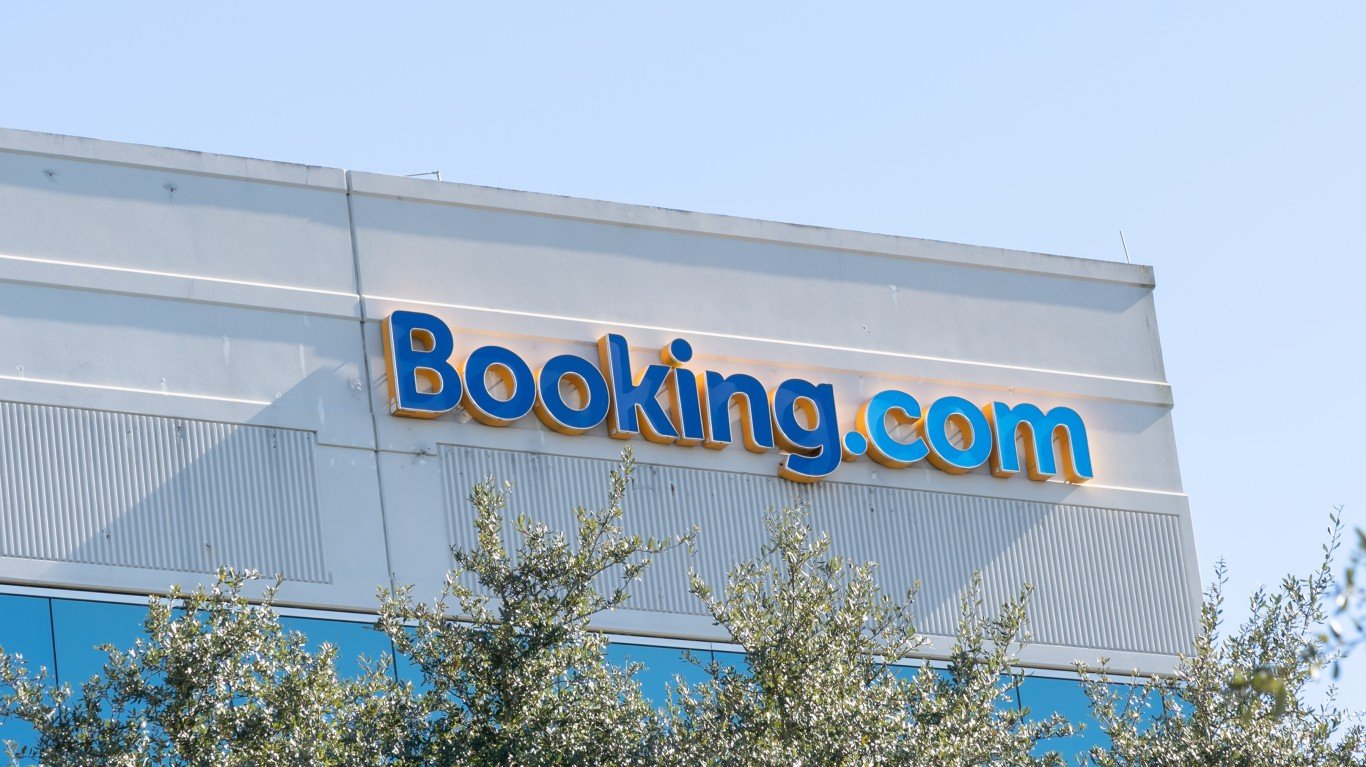
22. Booking Holdings
> Founded: 1997
> Annual revenue: $11.0 billion
> Fortune 500 rank: #340 of 500
> Employee count: 20,199
Booking Holdings, founded in 1997 as Priceline.com, began as an online travel agency with its “Name Your Own Price” bidding system. Today, Booking Holdings is a global leader in the industry, with operations in over 220 countries and annual revenue of $11.0 billion. In 2022, the company ranked No. 340 on the Fortune 500. Despite the challenges posed by the COVID-19 pandemic, Booking Holdings recovered, with gross bookings in 2022 surpassing 2019.
[in-text-ad]

21. Netflix
> Founded: 1997
> Annual revenue: $29.7 billion
> Fortune 500 rank: #115 of 500
> Employee count: 11,300
Netflix was founded in 1997 by Reed Hastings and Marc Randolph as an online DVD rental business. In 2007, it introduced streaming of movies and TV shows to rental members, over time expanding the streaming service to 190 countries. In 2012, Netflix also began introducing original programming. Despite competition, Netflix remains the world’s largest streaming service with over 220 million paid subscribers. With annual revenue of $29.7 billion, it ranks 115th on the Fortune 500.
20. Equinix
> Founded: 1998
> Annual revenue: $6.6 billion
> Fortune 500 rank: #487 of 500
> Employee count: 10,944
Equinix was founded in 1998 by Jay Adelson and Al Avery with the aim of providing businesses with physical connection to the digital world, that is, a place businesses can share networking equipment, space, and bandwidth. Since then, the company has grown to become a global leader in the digital infrastructure industry with 248 data centers in 32 countries. With annual revenue of $6.6 billion, Equinix ranks No. 487 on the Fortune 500.

19. Builders FirstSource
> Founded: 1998
> Annual revenue: $19.9 billion
> Fortune 500 rank: #176 of 500
> Employee count: 28,000
Founded in 1998, Builders FirstSource expanded through a combination of organic growth and strategic acquisitions to become a leading supplier of building materials for residential construction in the U.S. It now has operations in 42 states. The company’s total annual revenue is $19.9 billion, and it is currently ranked 176th on the Fortune 500 list.
[in-text-ad-2]
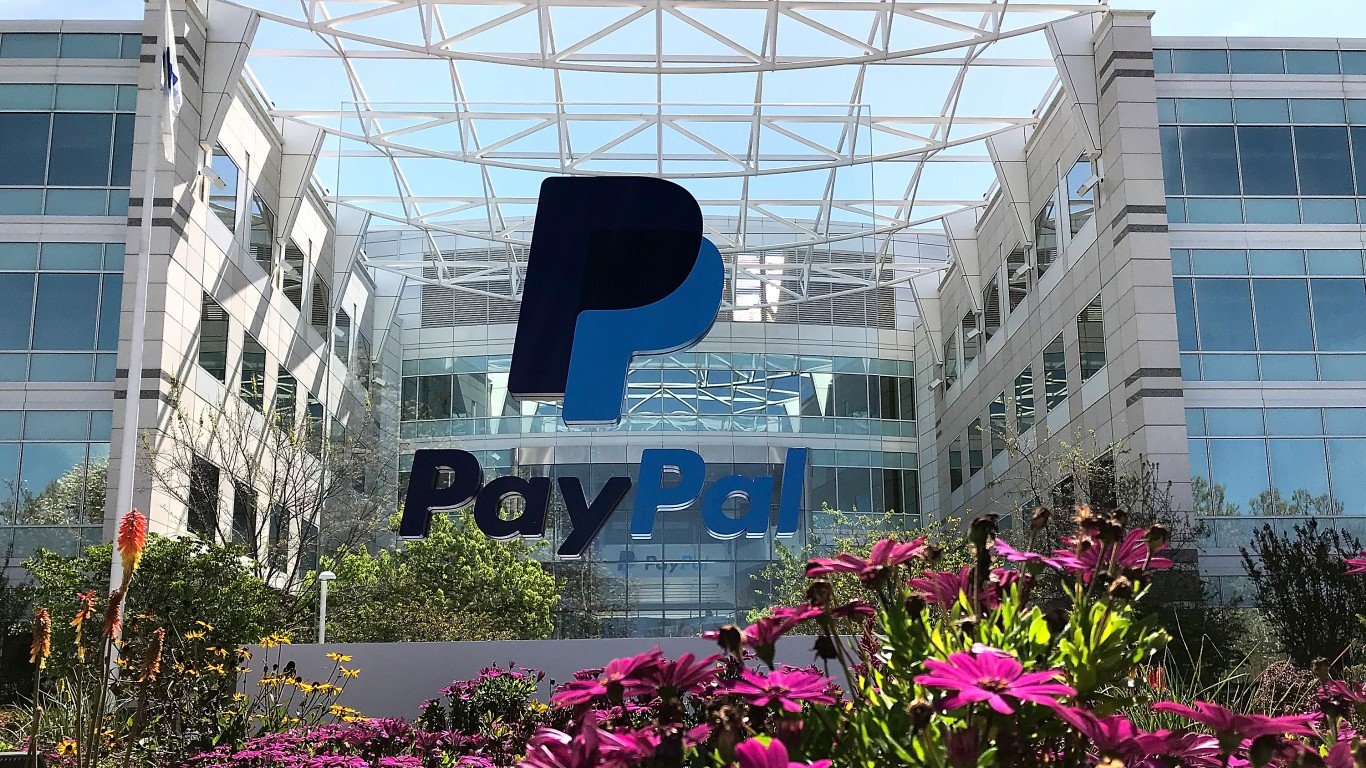
18. PayPal
> Founded: 1998
> Annual revenue: $25.4 billion
> Fortune 500 rank: #143 of 500
> Employee count: 30,900
PayPal was founded in 1998 as an online payment system to securely transfer money between consumers and businesses. Since then, it has grown to become a leader in digital payments, transforming the traditional banking system. PayPal expanded its services to include mobile payments and international money transfers. Today it boasts 435 million active consumer and merchant accounts, 22.3 billion payment transactions, and a total payment volume of $1.36 trillion.

17. Alphabet
> Founded: 1998
> Annual revenue: $257.6 billion
> Fortune 500 rank: #8 of 500
> Employee count: 156,500
Alphabet was created through the restructuring of Google, which was founded in 1998 by Larry Page and Sergey Brin as a search engine company. Since its founding, Google has grown to be one of the world’s largest tech companies, providing, in addition to a search engine, such widely known products and services as YouTube and Android, the mobile operating system.
Google restructured to become Alphabet in 2015, making Google its subsidiary. With a reported revenue of $257.6 billion, it is one of the most successful companies of its time and is currently ranked at the No. 8 spot on the Fortune 500. Alphabet, through its subsidiaries, also offers such products and services as smart home products Google Nest and autonomous driving technology company Waymo.
[in-text-ad]
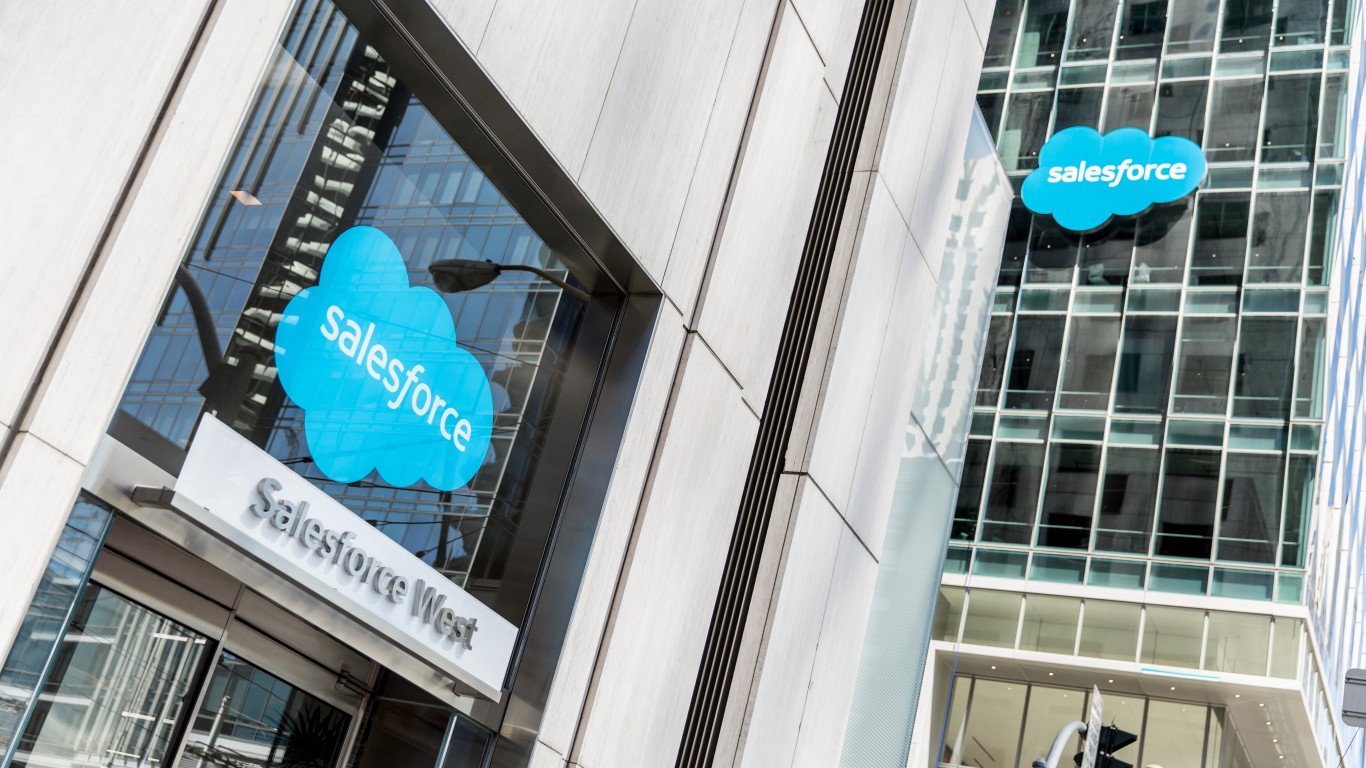
16. Salesforce
> Founded: 1999
> Annual revenue: $26.5 billion
> Fortune 500 rank: #136 of 500
> Employee count: 73,541
Salesforce was founded in 1999 by Marc Benioff, Parker Harris, Frank Dominguez, and Dave Moellenhoff as a customer relationship management software company. In the 20 years since its founding, Salesforce has grown – adding to its suite of products and services and counting more 150,000 companies among its customers. In 2020, Salesforce was added to the Dow Jones Industrial Average stock index, replacing Exxon Mobil. With an annual revenue of $26.5 billion, it ranks No. 136 on the Fortune 500.
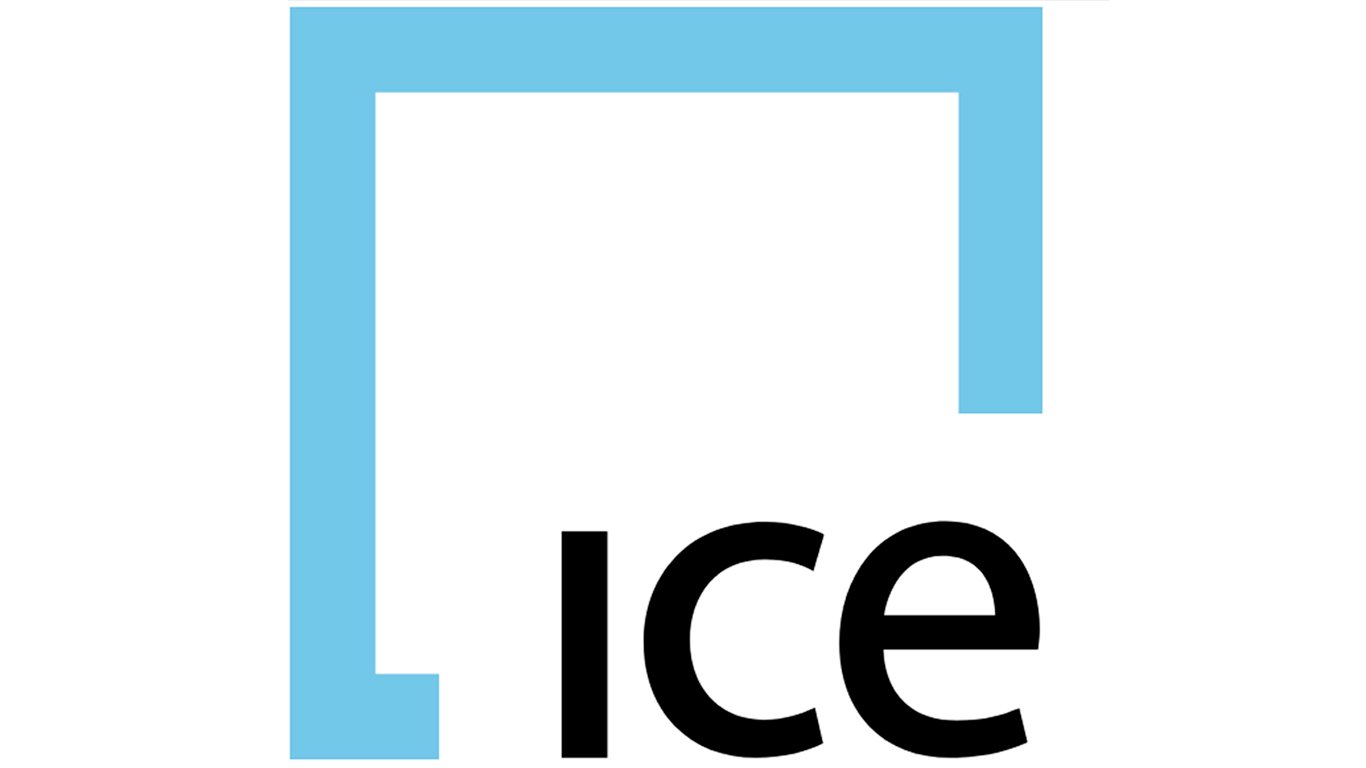
15. Intercontinental Exchange
> Founded: 2000
> Annual revenue: $9.2 billion
> Fortune 500 rank: #384 of 500
> Employee count: 8,858
Intercontinental Exchange is a global network of financial exchanges founded in 2000 with the goal of digitizing the energy markets and providing greater price transparency. Today, ICE operations include data and technology services, central clearing houses, and futures exchanges and cash exchanges in commodities, foreign exchange, and equity index futures, among other operations. ICE reported $9.2 billion in annual revenue and ranks No. 384 on the Fortune 500.
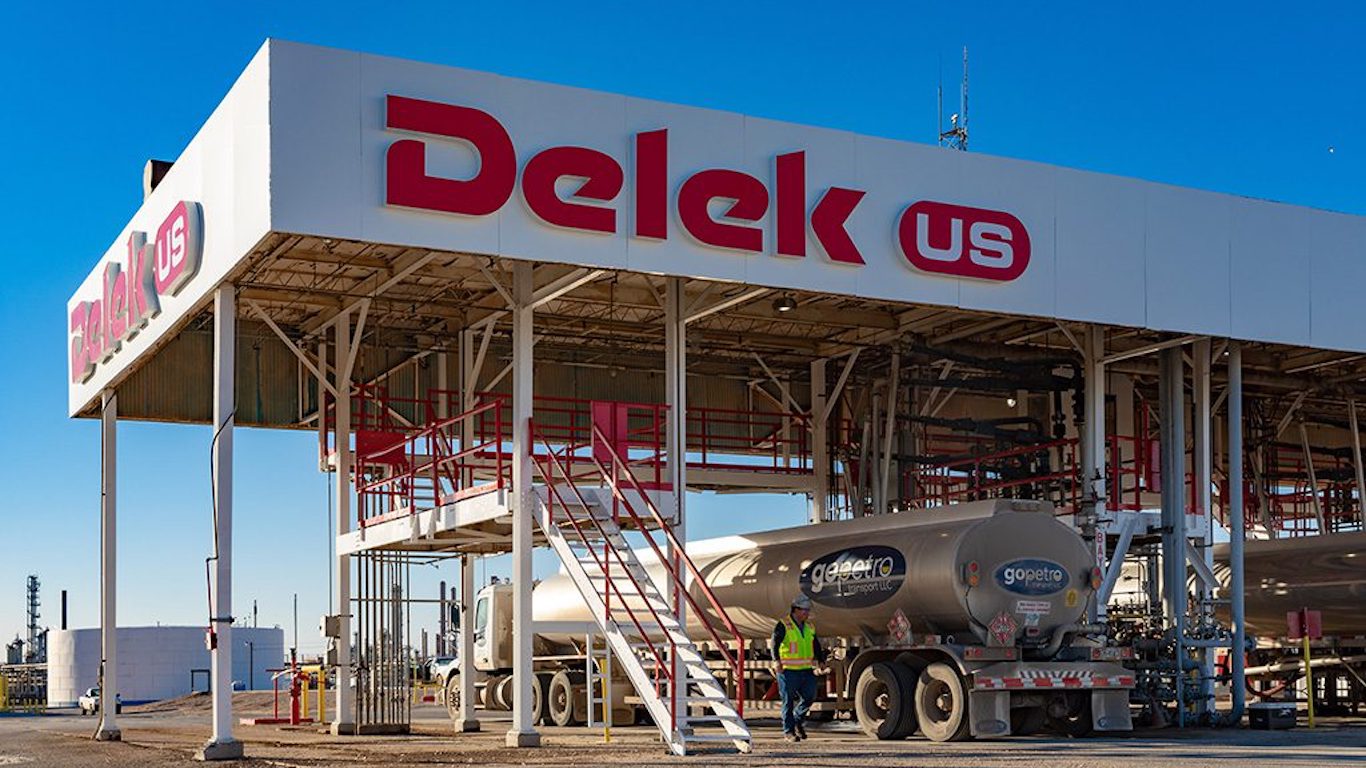
14. Delek US Holdings
> Founded: 2001
> Annual revenue: $10.6 billion
> Fortune 500 rank: #346 of 500
> Employee count: 3,312
Founded in 2001, Delek US Holdings is a downstream energy company focused on petroleum refining and supply and on retail marketing. Since its founding, the business has grown through mergers, acquisitions, and organic growth and today has assets in petroleum refining, logistics, convenience stores, asphalt, and renewables. The company’s annual revenue of $10.6 billion ranks No. 346 on the Fortune 500.
[in-text-ad-2]
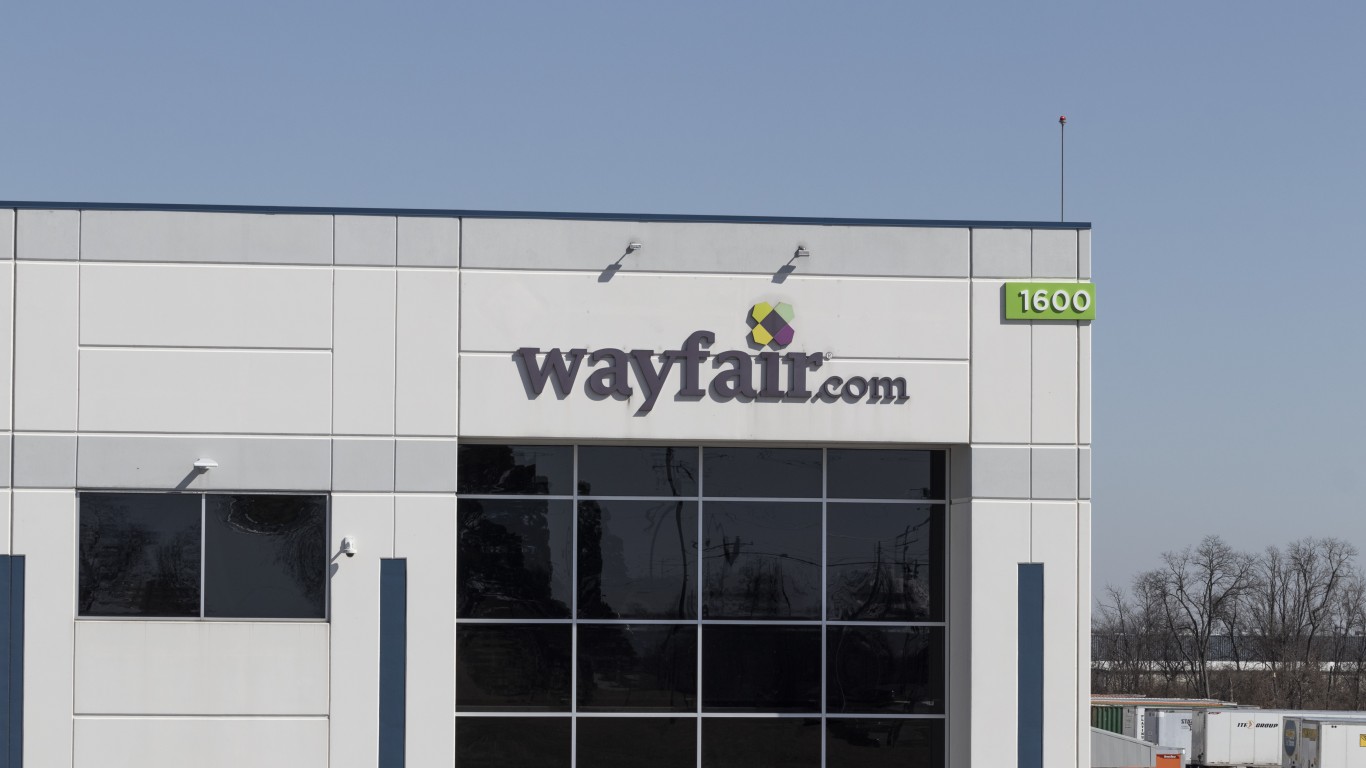
13. Wayfair
> Founded: 2002
> Annual revenue: $13.7 billion
> Fortune 500 rank: #275 of 500
> Employee count: 16,681
Wayfair was founded in 2002 as CSN Stores with the mission to give shoppers more selection of products for their home. The Wayfair brand was created in 2011 by merging the over 200 online stores the company had by then. In 2014, Wayfair was listed on the New York Stock Exchange. Today, the company’s total annual revenue of $13.7 billion ranks No. 275 on the Fortune 500.

12. Tesla
> Founded: 2003
> Annual revenue: $53.8 billion
> Fortune 500 rank: #65 of 500
> Employee count: 99,290
Electric car company Tesla was founded in 2003 by two engineers, Martin Eberhard and Marc Tarpenning, who named the company after the famous inventor Nikola Tesla. Elon Musk became involved by investing in the company in 2004, when he also began serving as chairman of the board. Musk assumed the role of CEO in 2008, shortly after Tesla’s first electric vehicle, the Roadster, was manufactured. Since then, the company has become a force in the automobile industry and the leader among electric car companies by several measures, most notably electric cars production, delivering over 1.3 million units in 2022.
[in-text-ad]
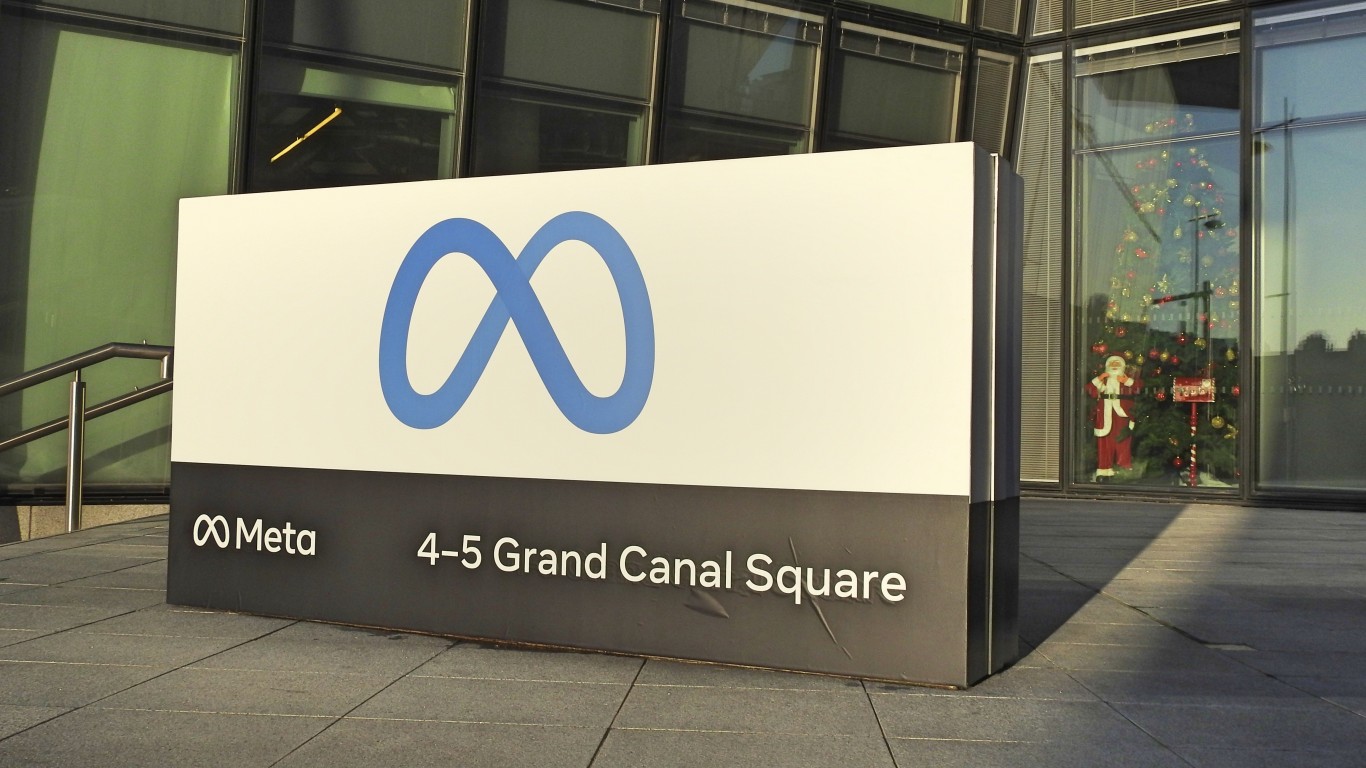
11. Meta Platforms
> Founded: 2004
> Annual revenue: $117.9 billion
> Fortune 500 rank: #27 of 500
> Employee count: 71,970
Meta Platforms, formerly Facebook, was founded in 2004, when TheFacebook site was launched by Harvard University students Mark Zuckerberg, Eduardo Saverin, Dustin Moskovitz, and Chris Hughes. It was intended to provide a way for Harvard students to connect with each other. Facebook gradually expanded access to the social network over the years, growing rapidly, and launching multiple products and services. In 2021, the company changed its name to Meta, bringing the different apps and technology under one brand. With annual revenue at $117.9 billion, Meta Platforms ranks 27th on the Fortune 500.

10. Targa Resources
> Founded: 2005
> Annual revenue: $16.9 billion
> Fortune 500 rank: #216 of 500
> Employee count: 2,430
Targa Resources is a midstream energy company that was founded in 2005. The company is primarily in the business of transporting, storing, fractionating, treating, and selling natural gas and natural gas liquids and gathering, storing, terminaling, and selling crude oil. With annual revenue of $16.9 billion, it ranks No. 16 on the Fortune 500.

9. Zillow Group
> Founded: 2006
> Annual revenue: $8.1 billion
> Fortune 500 rank: #424 of 500
> Employee count: 8,005
Zillow Group, a real estate marketplace company, was co-founded in 2006 by five tech executives who believed technology would revolutionize real estate. Over time, the company has become a major player in the real estate market. Today, Zillow has data on about 140 million homes, and according to its estimates 4.1 million actual buyers shopped using Zillow in 2021. With $8.1 billion in annual revenue, it ranks No. 424 on the Fortune 500.
[in-text-ad-2]

8. Diamondback Energy
> Founded: 2007
> Annual revenue: $6.8 billion
> Fortune 500 rank: #479 of 500
> Employee count: 870
Diamondback Energy was founded in 2007 with the acquisition of 4,174 net acres in the Permian Basin. The oil and natural gas company, headquartered in Midland, Texas, is focused on the exploration of onshore oil and natural gas reserves in the area through hydrocarbon recovery. As of the end of 2022, it had 2,033 million barrels of oil equivalent proved reserves. It currently has $6.8 billion in annual revenue and is No. 479 on the Fortune 500.
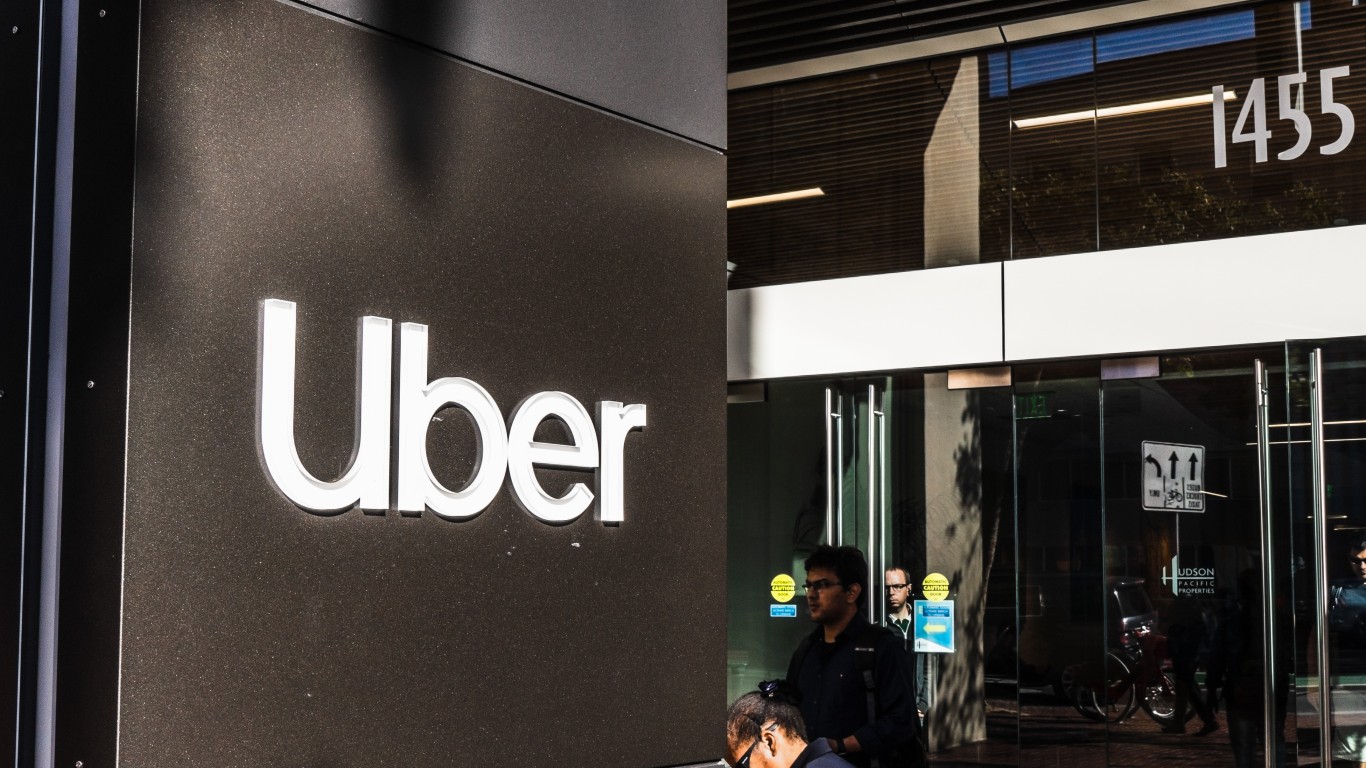
7. Uber Technologies
> Founded: 2009
> Annual revenue: $17.5 billion
> Fortune 500 rank: #210 of 500
> Employee count: 29,300
Uber Technologies was founded in 2009 to provide on-demand transportation for riders using a phone app that connects riders and drivers. By 2010, Uber offered rides in San Francisco, and in just over a decade, it expanded operations to over 600 cities worldwide. Uber Eats, a food delivery service, made its debut in 2015. Monthly active drivers and couriers on Uber reached 5.4 million, and monthly active consumers reached 131 million, as of the end of 2022. With annual revenue of $17.5 billion, Uber ranks No. 210 on the Fortune 500.
[in-text-ad]

6. Block
> Founded: 2009
> Annual revenue: $17.7 billion
> Fortune 500 rank: #208 of 500
> Employee count: 8,521
Block, formerly Square, was founded in 2009 by Jack Dorsey, the co-founder of Twitter, and Jim McKelvey to provide a way for small and medium businesses to accept credit card payments by using a smartphone or tablet as a point-of-sale system. Square changed its name to Block in 2021, operating several brands, including Square, Cash App, Tidal, and TBD and Spiral, the company’s cryptocurrency initiatives. Block is ranked No. 208 on the Fortune 500 with $17.7 billion in annual revenue.

5. Moderna
> Founded: 2010
> Annual revenue: $18.5 billion
> Fortune 500 rank: #195 of 500
> Employee count: 2,700
Perhaps best known for its COVID-19 vaccines, Moderna, a play on modified RNA, was founded in 2010 with the aim of discovering new ways to use it to treat and prevent diseases using messenger RNA, or mRNA. The Cambridge, Massassuchests, based biotech mostly develops mRNA vaccines, and though its has 48 development programs, its only commercial product is the COVID-19 vaccine. With annual revenue of $18.5 billion, it ranks No. 195 on the Fortune 500.

4. Chewy
> Founded: 2011
> Annual revenue: $8.9 billion
> Fortune 500 rank: #394 of 500
> Employee count: 21,300
Chewy was founded in 2011 by Ryan Cohen and Michael Day as an online retailer of pet food and pet-related products. Since then, the company has been growing, enough to interest PetSmart, which acquired it in 2017 for $3.35 billion. The two companies were then split in late 2020 after both performed well during the pandemic as pet adoptions surged. Today, Chewy ranks No. 394 on the Fortune 500.
[in-text-ad-2]

3. Coinbase Global
> Founded: 2012
> Annual revenue: $7.8 billion
> Fortune 500 rank: #437 of 500
> Employee count: 3,730
Coinbase Global was founded in 2012 as an online platform to facilitate the buying and selling of cryptocurrencies such as bitcoin. The platform quickly gained traction and grew to approximately 110 million verified users in over 100 countries. With $7.8 billion in annual revenue, Coinbase Global ranks at No. 437 on the Fortune.

2. Carvana
> Founded: 2012
> Annual revenue: $12.8 billion
> Fortune 500 rank: #290 of 500
> Employee count: 21,000
Carvana was founded in 2012 as an online marketplace for buying and selling used cars. It grew quickly, going public in 2017. The coronavirus pandemic was good for Carvana, further boosting growth as shoppers shifted to online purchasing, especially with the company’s promise of no-hassle experience and delivery of the used vehicle to the customer’s home. With $12.8 billion in annual revenue, the company ranks No. 290 on the Fortune 500.
[in-text-ad]

1. Opendoor Technologies
> Founded: 2014
> Annual revenue: $8.0 billion
> Fortune 500 rank: #425 of 500
> Employee count: 2,816
Founded in 2014, Opendoor Technologies is a digital real estate marketplace that buys, sells, and exchanges houses. Since its founding, Opendoor has expanded to additional markets, offering full services in at least 25. Currently ranking No. 425 on the Fortune 500, Opendoor has recently reported $8 billion in annual revenue. However, company shares are down considerably over the past year, dropping 80% on the year.
Essential Tips for Investing: Sponsored
A financial advisor can help you understand the advantages and disadvantages of investment properties. Finding a qualified financial advisor doesn’t have to be hard. SmartAsset’s free tool matches you with up to three financial advisors who serve your area, and you can interview your advisor matches at no cost to decide which one is right for you. If you’re ready to find an advisor who can help you achieve your financial goals, get started now.
Investing in real estate can diversify your portfolio. But expanding your horizons may add additional costs. If you’re an investor looking to minimize expenses, consider checking out online brokerages. They often offer low investment fees, helping you maximize your profit.
Thank you for reading! Have some feedback for us?
Contact the 24/7 Wall St. editorial team.

 24/7 Wall St.
24/7 Wall St. 24/7 Wall St.
24/7 Wall St.


